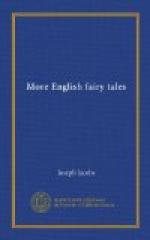A Son of Adam
A man was one day working. It was very hot, and he was digging. By-and-by he stopped to rest and wipe his face; and he was very angry to think he had to work so hard only because of Adam’s sin. So he complained bitterly, and said some very hard words about Adam.
It happened that his master heard him, and he asked, “Why do you blame Adam? You’d ha’ done just like Adam, if you’d a-been in his place.”
“No, I shouldn’t,” said the man; “I should ha’ know’d better.”
“Well, I’ll try you,” says his master; “come to me at dinner-time.”
So come dinner-time, the man came, and his master took him into a room where the table was a-set with good things of all sorts. And he said: “Now, you can eat as much as ever you like from any of the dishes on the table; but don’t touch the covered dish in the middle till I come back.” And with that the master went out of the room and left the man there all by himself.
So the man sat down and helped himself, and ate some o’ this dish and some o’ that, and enjoyed himself finely. But after awhile, as his master didn’t come back, he began to look at the covered dish, and to wonder whatever was in it. And he wondered more and more, and he says to himself, “It must be something very nice. Why shouldn’t I just look at it? I won’t touch it. There can’t be any harm in just peeping.” So at last he could hold back no longer, and he lifted up the cover a tiny bit; but he couldn’t see anything. Then he lifted it up a bit more, and out popped a mouse. The man tried to catch it; but it ran away and jumped off the table and he ran after it. It ran first into one corner, and then, just as he thought he’d got it, into another, and under the table, and all about the room. And the man made such a clatter, jumping and banging and running round after the mouse, a-trying to catch it, that at last his master came in.
“Ah!” he said; “never you blame Adam again, my man!”
The Children in the Wood
Now ponder well, you
parents dear,
These words
which I shall write;
A doleful story you
shall hear,
In time
brought forth to light.
A gentleman of good
account,
In Norfolk
dwelt of late,
Who did in honour far
surmount
Most men
of his estate.
Sore sick he was and
like to die,
No help
his life could save;
His wife by him as sick
did lie,
And both
possest one grave.
No love between these
two was lost,
Each was
to other kind;
In love they lived,
in love they died,
And left
two babes behind.
The one a fine and pretty
boy
Not passing
three years old,
The other a girl more
young than he,
And framed
in beauty’s mould.
The father left his
little son,
As plainly
did appear,
When he to perfect age
should come,
Three hundred
pounds a year;




